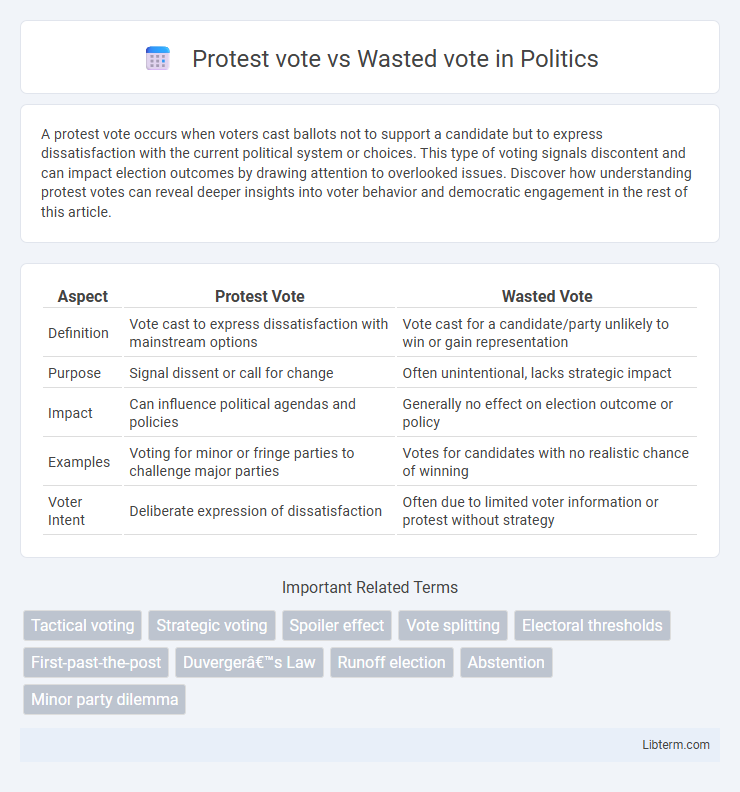A protest vote occurs when voters cast ballots not to support a candidate but to express dissatisfaction with the current political system or choices. This type of voting signals discontent and can impact election outcomes by drawing attention to overlooked issues. Discover how understanding protest votes can reveal deeper insights into voter behavior and democratic engagement in the rest of this article.
Table of Comparison
| Aspect | Protest Vote | Wasted Vote |
|---|---|---|
| Definition | Vote cast to express dissatisfaction with mainstream options | Vote cast for a candidate/party unlikely to win or gain representation |
| Purpose | Signal dissent or call for change | Often unintentional, lacks strategic impact |
| Impact | Can influence political agendas and policies | Generally no effect on election outcome or policy |
| Examples | Voting for minor or fringe parties to challenge major parties | Votes for candidates with no realistic chance of winning |
| Voter Intent | Deliberate expression of dissatisfaction | Often due to limited voter information or protest without strategy |
Understanding Protest Votes and Wasted Votes
Protest votes express dissatisfaction with mainstream candidates, signaling voter discontent without expecting electoral success. Wasted votes occur when ballots are cast for candidates or parties unlikely to win, effectively having no impact on the election outcome. Differentiating these concepts helps analyze voter behavior and the implications for democratic representation.
The Psychology Behind Protest Voting
Protest voting stems from voter dissatisfaction and is a psychological expression of frustration with mainstream political options, often driven by alienation and a desire to signal discontent. Unlike wasted votes, which refer to ballots cast for candidates unlikely to win, protest votes carry symbolic weight and can influence party platforms by highlighting neglected issues. This behavior reveals deep cognitive biases and emotional responses, such as the need for political efficacy despite perceived systemic flaws.
Why Some Votes Are Considered "Wasted
Some votes are considered "wasted" when they do not influence the election outcome, such as votes cast for losing candidates or excess votes beyond what a winner needed to secure victory. Protest votes, cast deliberately to express dissatisfaction with available choices, may also be viewed as wasted if they fail to affect the overall results. In electoral systems like first-past-the-post, the distribution of votes often amplifies the perception of wasted ballots, reducing the impact of minority views.
Protest Vote: Voices Seeking Change
Protest votes represent ballots cast to express dissatisfaction with the current political system or candidates, often signaling a desire for significant change or reform. These votes underscore voters' intent to challenge the status quo rather than merely wasting their electoral power on unlikely winners. Unlike wasted votes, which fail to influence outcomes, protest votes highlight active participation and are crucial indicators of public sentiment demanding transformation.
Wasted Vote: Perception vs. Reality
Wasted votes are often perceived as ballots cast for losing candidates or votes exceeding the threshold needed for victory, fueling voter apathy and skepticism about electoral impact. However, the reality is that even votes for non-winning candidates contribute to shaping political discourse, influencing future policy decisions, and demonstrating public support for alternative viewpoints. Understanding the distinction between emotional perception and statistical influence helps voters recognize that all votes have significance beyond the immediate outcome.
Electoral Systems and Their Impact on Voting Choices
Electoral systems significantly influence the distinction between protest votes and wasted votes by shaping voter incentives and perceptions of vote efficacy. Proportional representation systems tend to minimize wasted votes by allocating seats more closely aligned with vote shares, encouraging voters to cast protest votes without fearing their vote will be wasted. In contrast, majoritarian or first-past-the-post systems often increase the likelihood of wasted votes, as votes for losing candidates do not contribute to representation, discouraging protest voting and promoting strategic vote choices.
Historical Examples of Protest and Wasted Votes
Protest votes have historically influenced political outcomes by signaling public dissatisfaction, such as the 1912 U.S. presidential election when Theodore Roosevelt's Bull Moose Party split the Republican vote, altering the result. Wasted votes are often cited in proportional representation disputes, like the 2015 Spanish general election, where votes for smaller parties failed to convert into seats due to electoral thresholds. Both protest and wasted votes highlight the impact of voter behavior on election systems and political legitimacy.
Consequences of Casting a Protest Vote
Casting a protest vote often leads to diminished political influence as these votes typically do not support candidates likely to win, weakening the overall impact on election outcomes. This can result in wasted votes that fail to contribute to forming a government or influencing policy decisions, thereby reducing voter effectiveness. Consequently, protest votes may inadvertently empower dominant parties by splitting opposition support and lowering the chances of meaningful change.
Strategies to Make Every Vote Count
Protest votes signal voter dissatisfaction but risk being classified as wasted votes if cast for fringe candidates unlikely to win. Strategies to make every vote count include ranking candidates in systems like instant-runoff voting or supporting viable alternatives aligned with core values. Electoral reforms such as proportional representation also reduce wasted votes by translating smaller support into legislative seats.
Protest Vote vs. Wasted Vote: Which Drives Democracy?
Protest votes express voter dissatisfaction by deliberately supporting less mainstream candidates, signaling demand for change within democratic systems. Wasted votes occur when ballots cast for losing candidates fail to influence election outcomes, potentially discouraging voter participation. Understanding the balance between protest and wasted votes is crucial for strengthening democratic responsiveness and encouraging inclusive political engagement.
Protest vote Infographic

 libterm.com
libterm.com